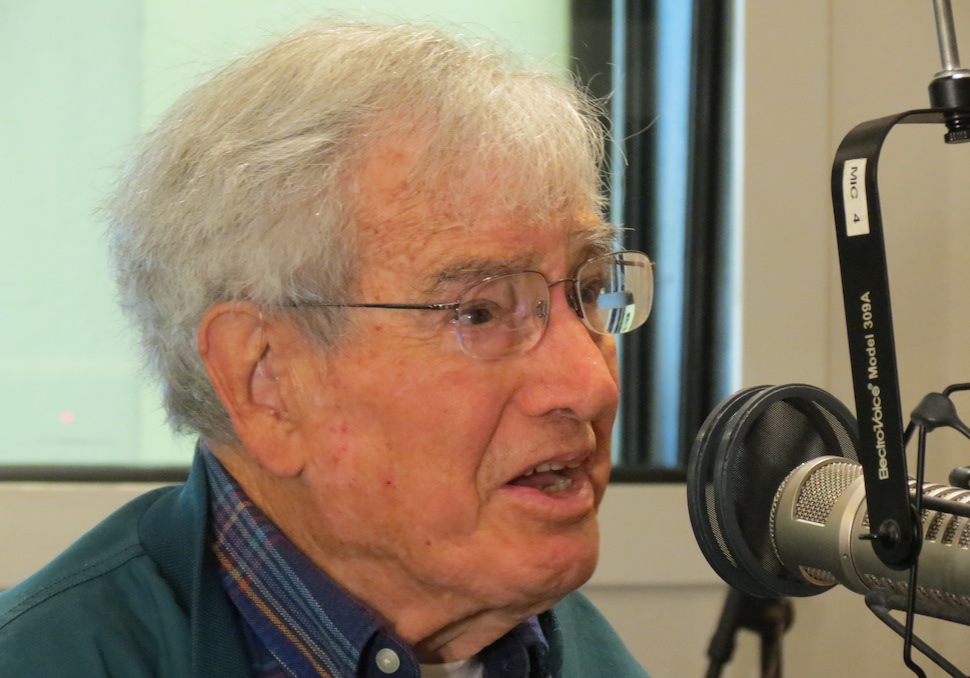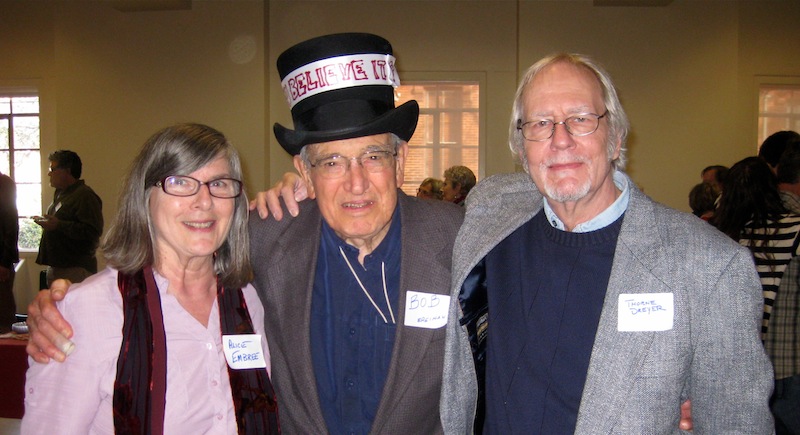He opened the Methodist Student Center to an alternative view of the world during a period of tremendous upheaval.

Rev. Bob Breihan on Rag Radio in the studios of KOOP-FM in Austin, Nov. 29, 2013. Photo by Roger Baker / The Rag Blog.
 Listen to Thorne Dreyer‘s hour-long Nov. 29, 2013 Rag Radio interview with Rev. Bob Breihan, here.
Listen to Thorne Dreyer‘s hour-long Nov. 29, 2013 Rag Radio interview with Rev. Bob Breihan, here.
AUSTIN — Rev. Bob Breihan passed on, surrounded by loved ones, in his home in Austin, Texas, on November 4, 2017. He was 92.
A celebration of his life will be held at 2 p.m., Saturday, November 18, 2017, at University United Methodist Church in Austin.
In lieu of flowers, the family asks that donations be made in Bob Breihan’s name to University United Methodist Church, 2409 Guadalupe, Austin, Texas 78705; to the Southern Poverty Law Center, 400 Washington Avenue, Montgomery, Alabama 36104; or to a charity of your choice.
The Austin American-Statesman published an obituary on November 12, 2017.
Bob Breihan will be remembered by those of us fortunate enough to know him in the ‘60s and ‘70s as the director of the Methodist Student Center, a vibrant home to peace and social justice advocacy and a multitude of cultural events. The Center housed Ichthus Coffee House, Sattva Restaurant, and the Latin American Policy Alternatives Group (LAPAG). Bob Breihan, an ardent defender of civil, human, and gender rights, provided both draft and birth control counseling.
The following account by The Rag Blog‘s Alice Embree was first published on January 7, 2015, on the occasion of Bob Breihan’s 90th birthday party.

Rev. Bob Breihan, center, with The Rag Blog‘s Alice Embree and Thorne Dreyer, at his 90th birthday party, Jan. 7, 2015. Photo by
Carlos Lowry / The Rag Blog.
Spiritual counselor and social activist Bob Breihan is celebrated on the occasion of his 90th birthday.
AUSTIN — Rev. Bob Breihan sported a black top hat — with the words “Can you believe it?” — at a party held for him on Sunday, January 4, 2015. A large gathering of family, church colleagues, and long-time friends came together at the University Methodist Church in Austin to celebrate his 90th birthday.
Bob Breihan was a prominent voice in the 1950s movement to desegregate Austin, a courageous advocate for reproductive rights, and a vocal opponent of the Vietnam War. Between 1960 and 1980, Bob Breihan was director of the Methodist Student Center on Guadalupe — a place that opened its doors to young people who were part of the political and social movements of the day.
The Methodist Student Center was home to the Ichthus Coffee House where Pete Seeger, Janis Joplin, and local folksingers performed, to draft counseling, to Latin American solidarity work, and to abortion counseling. It was torn down in 1989 to become a paid parking lot.
Terry Dubose said Bob ‘helped me
screw my head back on.’
Terry Dubose, former statewide organizer for Vietnam Veterans Against the War (VVAW), spoke of Bob as someone who “helped me screw my head back on” after Terry returned from Vietnam with survivor’s guilt. He also let Terry use the mimeograph machine to produce anti-war leaflets.
Terry went on to work in the emerging field of sonography, helping to found a diagnostic medical sonography program at Austin Community College in 1989, and in 1996 becoming director of the sonography program at the University of Arkansas for Medical Sciences. When Bob Breihan and his wife, Rev. Sarah Bentley, visited Terry and Lucy Dubose in Little Rock, Terry learned for the first time that Bob had been there in 1957 to support the contentious integration of Little Rock High School.
On a personal note, I knew Bob Breihan as the person who opened the kitchen doors to the Methodist Student Center. In 1971, I asked him if he was familiar with Saatva, the collectively-run vegetarian restaurant operating at the Hillel Center. It was losing its space there. He told me that he had eaten at Saatva and had gotten an upset stomach. But, he still opened the doors to us for our lunchtime restaurant.
I chopped a lot of onions and garlic in that kitchen. I recall the look on the health inspector’s face when he showed up at our door asking, “Who’s the top banana here?” and got a response from Jay McGee, whose long hair was held back in a ponytail. Jay answered in his low, gravelly voice: “We ate him for lunch.”
In the 1970s, the Methodist Student Center housed Austin’s Latin American Policy Alternative Group (LAPAG). Philip Russell and Cam and Sue Duncan worked there. LAPAG did a weekly Latin American news radio show and brought great Latin American films to the University campus. LAPAG’s work lay the foundation for Latin American solidarity activity during the period following the 1973 coup in Chile and the U.S. support for dictators in Central America in the 1980s.
Bob Breihan married Carlos Lowry
and me in our backyard.
Bob Breihan wrote me a personal note when my father, who was a professor at UT, died in 1984, recalling working with him in an ecumenical group trying to integrate Austin restaurants. Bob also asked me to go up to Southwestern University to speak about alternative lifestyles. I went there with Linda Evans, a colleague at Red River Women’s Press. That’s where I met my husband, Carlos Lowry. Bob Breihan married us in our backyard four years later.
The Methodist Student Center, like the University Y in Austin, made space available for an alternative view of the world during a period of tremendous upheaval during the ‘60s. Faith communities continue to be powerful allies on the front lines of many local struggles — for immigrant rights, Palestinian rights, and LGBTQ rights, to name a few. The courage of faith leaders like Bob Breihan continues.
Bob Breihan went on to found the New Life Institute in 1986, a nonprofit training organization that provides emotional and spiritual counseling on a sliding scale to those in need. He is now retired. He remains an example of staying true to your beliefs through the decades.
In a lighter vein, Rag Blog editor Thorne Dreyer remembers that Breihan “not only offered us a safe haven and a helping hand, he let me read poetry at the Ichthus Coffee House. That really took some courage.”
[Alice Embree is an Austin writer and activist. She contributed to Sisterhood is Powerful, writes for The Rag Blog, and is a member of Democratic Socialists of America (DSA). Embree is also an editor of the book, Celebrating The Rag: Austin’s Iconic Underground Newspaper.]
- Read more articles by Alice Embree on The Rag Blog.


















Sincere sympathy wishes to Alice, Carlos, Thorne, and all in your community who mourn the loss of Rev. Breihan.
Oh my, the memories.
I pulled my very first all-nighter at UT exam time in the coffee house at the Methodist Student Center. It was my first semester after provisional admission to the big university and I had a case of “imposter syndrome” that I never shook entirely, but I felt welcome at the Methodist Student Center as I later would at the University Y. There, at least, nobody was going to tap me on the shoulder and say, “There’s been a mistake, Mr. Russell, and you’ll have to leave….”
Bob was a dear friend and colleague who worked side by side with the workers at the People’s Free Clinic in the basement of the First Congregational Church as we struggled to provide problem pregnancy counseling and referrals for safe abortions. He could be counted on to support those most in need of quality and compassionate health care.
He was a visionary with great strength to support his many causes. Our community is a better place because of Bob. work.
Condolences! I know he meant a lot to you and Chris, and many others. I had the privilege seeing him a couple of times at your place. He was a class act. He made a difference.
Bob Breihan was a dear friend and counselor to me through many years. Living as a freshman at the uptight Methodist women’s dorm (Kirby Hall, 1964-65), the Icthus Coffee House was a safe, acceptable place for a single girl to drink hot cider on a cold night. I met the first person I ever smoked weed with there, playing his guitar to raise money to pay his lawyer for a possession bust; how intriguing! And the Methodist Student Center was where I did my first “movement shitwork,” dragged out of the Student Union by organizer-extraordinaire Bob Speck to collate and staple booklets for the UT “colloquy” on “Viet Nam,” a safe, acceptable (or so it would seem!) alternative to the radical teach-ins sweeping other campuses (spring ’65). I didn’t get to know Bob, the imposing but friendly director, until George Vizard asked me to marry him and we decided that the Meth chapel was where we wanted to do it. Bob sat down and talked with us about marriage a couple of times, raising issues the two of us never had a chance to encounter in real life, but making me, at least, stop and think about what a step I was taking, with a man for whom “safe and acceptable” would never be a big consideration. When George was murdered, Bob was a rock for me, not only conducting the funeral but meeting with me regularly for some time after, recommending, for example, a civil attorney who helped me with the practicalities of being a 20-year-old widow in the days of chattel limitations. (I became, legally, a “femme sole.”)
The Icthus and the Meth were central to the social life of the emerging hip community for a long time, and Bob was always a wise and patient guardian of this resource as well as shepherd of his flock. “Hippy bands” played there when Austin night clubs still shunned the weird crowd. There were summer plays and other activities during the long dull months when the town was half empty. George read “Pooh” there. Kenny Parker was playing flamenco the night George and I actually got together for the first time. The Free University of Austin held classes there in during, if I remember correctly, 1966-67; I read Camus for the first time and was blown away. Radical grad students taught most of the classes and I can visualize the philosophy grad who taught the Camus class but can’t quite come up with his name.
Through it all, Bob Breihan was never obtrusive, never preachy, never pushy or self-righteous. He was just a very natural, generally relaxed guy who was genuinely interested in people, life, and the roots of happiness and inner peace. He had a great life, and I’m so glad I knew him! RIP, Bob — to everything there is a season, and a time for every purpose under heaven.